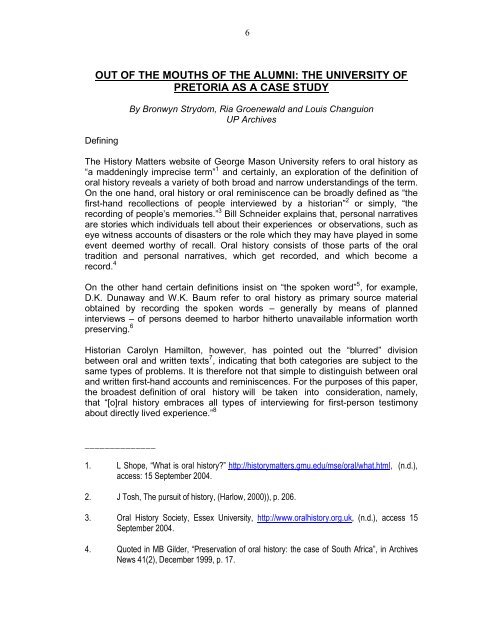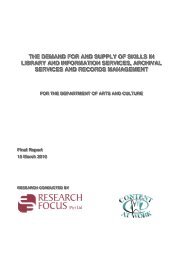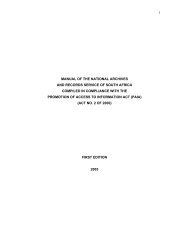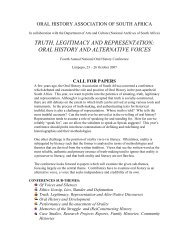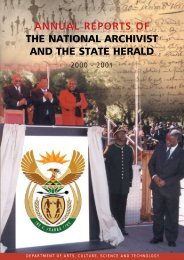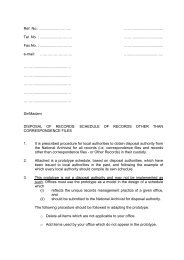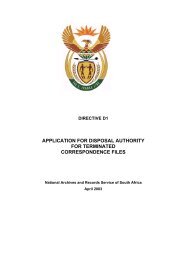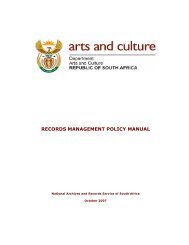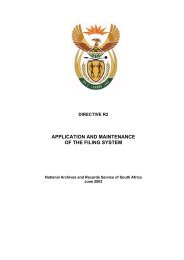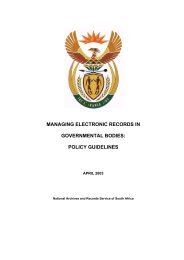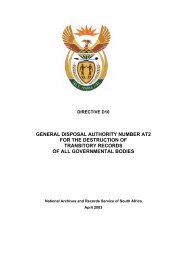Oral History - National Archives of South Africa
Oral History - National Archives of South Africa
Oral History - National Archives of South Africa
You also want an ePaper? Increase the reach of your titles
YUMPU automatically turns print PDFs into web optimized ePapers that Google loves.
6OUT OF THE MOUTHS OF THE ALUMNI: THE UNIVERSITY OFPRETORIA AS A CASE STUDYDefiningBy Bronwyn Strydom, Ria Groenewald and Louis ChanguionUP <strong>Archives</strong>The <strong>History</strong> Matters website <strong>of</strong> George Mason University refers to oral history as“a maddeningly imprecise term” 1 and certainly, an exploration <strong>of</strong> the definition <strong>of</strong>oral history reveals a variety <strong>of</strong> both broad and narrow understandings <strong>of</strong> the term.On the one hand, oral history or oral reminiscence can be broadly defined as “thefirst-hand recollections <strong>of</strong> people interviewed by a historian” 2 or simply, “therecording <strong>of</strong> people’s memories.” 3 Bill Schneider explains that, personal narrativesare stories which individuals tell about their experiences or observations, such aseye witness accounts <strong>of</strong> disasters or the role which they may have played in someevent deemed worthy <strong>of</strong> recall. <strong>Oral</strong> history consists <strong>of</strong> those parts <strong>of</strong> the oraltradition and personal narratives, which get recorded, and which become arecord. 4On the other hand certain definitions insist on “the spoken word” 5 , for example,D.K. Dunaway and W.K. Baum refer to oral history as primary source materialobtained by recording the spoken words – generally by means <strong>of</strong> plannedinterviews – <strong>of</strong> persons deemed to harbor hitherto unavailable information worthpreserving. 6Historian Carolyn Hamilton, however, has pointed out the “blurred” divisionbetween oral and written texts 7 , indicating that both categories are subject to thesame types <strong>of</strong> problems. It is therefore not that simple to distinguish between oraland written first-hand accounts and reminiscences. For the purposes <strong>of</strong> this paper,the broadest definition <strong>of</strong> oral history will be taken into consideration, namely,that “[o]ral history embraces all types <strong>of</strong> interviewing for first-person testimonyabout directly lived experience.” 8______________1. L Shope, “What is oral history?” http://historymatters.gmu.edu/mse/oral/what.html, (n.d.),access: 15 September 2004.2. J Tosh, The pursuit <strong>of</strong> history, (Harlow, 2000)), p. 206.3. <strong>Oral</strong> <strong>History</strong> Society, Essex University, http://www.oralhistory.org.uk, (n.d.), access 15September 2004.4. Quoted in MB Gilder, “Preservation <strong>of</strong> oral history: the case <strong>of</strong> <strong>South</strong> <strong>Africa</strong>”, in <strong>Archives</strong>News 41(2), December 1999, p. 17.


